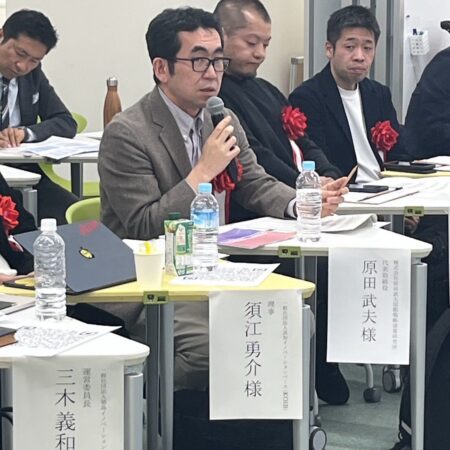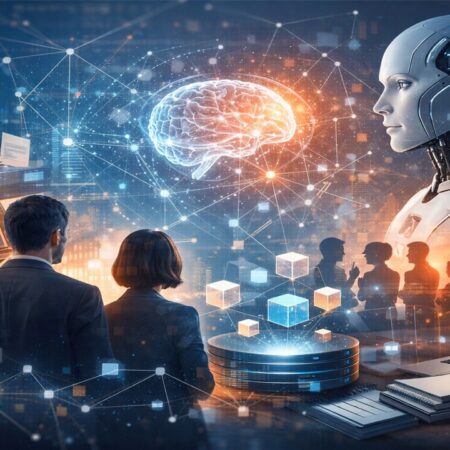Agentic AIとは何か?そしてChatGPTを誰も使わなくなる日(「IISIA技術ブログ」Vol. 20)
「トランプ米大統領候補狙撃事件」で世情が騒がしいが、今回はあえてそうした「目の前のこと」ではなく、少し俯瞰したところから見える世界について書きたいと思う。生成AI(Generative AI)、とりわけ大規模言語モデル(Large Language Model)を用いた対話システム(chatbot)の行方についてである。
こう書き始めるとおそらく読者の大部分は次の様に想われるのではないかと考える。
「この世界ではマーケティング上、優位に立っているChatGPTが当座使われることになるのではないか。よしんばOpenAI社によるその意味での優位が崩れることになったとしても、他の有力各社がすぐさまその地位を奪うことになるのであって、LLMに基づくchatbotが画像生成と言う意味での生成AI(Generative AI)を飲みこんで行くという流れそのものは全く変わらないのではないか。」
恐らくは同様の見解を我が国のAI専門家であっても思っているのではないだろうか。筆者は過日(5月末)、一般社団法人人工知能学会の全国大会(浜松)に出席したが、その場においても同様の論調が支配的であったことを今でも良く覚えている。興味深かったのは、その直前にマカオで出席した国連大学マカオ研究所主催のAiサミットではむしろ「GAI(汎用人工知能)」に関する議論が大半であったことと、浜松における論調が余りにも違っていた点であったわけだが、実は同様のことがつい先日出席した「ポイント・ゼロ・フォーラム(Point Zero Forum)」(チューリッヒ)についても言えたのである。実のところその場で極めて衝撃的な発言を、米国で今、連邦議会における議会証言を最新AIトレンドについて行っている研究者から席上にて聞いたのだ。
「ChatGPTはこのままいくと年内(2024年内)に誰も使わなくなるだろう。これに代わって使われるのがエージェンティックAI(Agentic AI。「エージェント型AI」と訳される場合も多いが、通常のエージェントとは明らかに異なる術語であるので以下はエージェンティックAIで統一する)だ。」
エージェントアプローチというのは我が国におけるAI研究でもしばしば用いられる術語である。したがって驚きはないわけであるわけだが、チューリッヒでは「エージェンティックAI(Agentic AI)」と、明らかにこれとは異なる術語を用いていたのである。寡聞にして筆者はこれを知らなかったので、スイスから帰国後、直ちに調査を開始した。しかし実際のところ、論文検索システムを用いても現状、この「エージェンティックAI(Agentic AI)」について検索してみても、あまり論文がヒットしないのだ。このことは決してこの術語が指し示す技術、製品が存在しないことを意味しない。むしろ「論文として公開すると模倣されてしまう危険性が高いため、あえて関連情報をアカデミズムとの関係でも披歴しない」というアプローチが最先端の技術者・研究者らによってとられている危険性が高い可能性すらあるのだ。しかしそうした中で比較的俯瞰する様な記載をしている論文[Shavit et al. 23]が公表されているので、これに基づき今回は「エージェンティックAI(Agentic Ai)」とは何かについて小稿を披歴することと致したい(なお論文の発行元はOpenAI社である。「何をかいわんや」という事実であるので、今後の展開可能性を示唆するものとして付記しておきたい)。
まずそもそも「エージェンティックAI(Agentic AI)」とは何であるのか。この点について[Shavit et al. 23]は次のとおり述べている。
Agentic AI systems are characterized by the ability to take actions which consistently contribute towards achieving goals over an extended period of time, without their behavior having been epecified in advance. In the cultural imagination, an AI agent is a helper that accomplishes arbitrary tasks for its user, like Smantha from Her or HAL 9000 from 2001: A Space Odyssey. Such agents are very different from current AI systems like GPT-4, which, while surprisingly knowledgeable and clever in some ways, can thus far only complete a limited range of real-world tasks. Yet there is no clear line along which to draw a binary distinction between “agents” and current AI systems like GPT-4. Instead, an AI system’s agenticness is best understood as involving multiple dimensions, along each of which we expect the field to continue to progress.
以上の様な概論を述べた上で、[Shavit et al. 23]はエージェンティックAI(Agentic AI)の鍵概念としてのagenticnessを次のとおり定義する。
We difine the degree of agenticness in a system as “the degree to which a system can adaptably achieve complex goals in complex environments with limited direct supervision.”
要するに指示を出来るだけ外部から受けないにも拘わらず、複雑な目標を複雑な環境の中で達成できるというのがagenticnessという性質なのだというわけなのであるが、さらに[Shavit et al. 23]はその詳細な要素として、「目標が複雑であること(goal complexity)」「環境が複雑であること(environmental complexity)」「予期せぬ環境への適応性(adaptability)」「独立した執行(independent execution)」を掲げている。そして次のとおり述べるのである。
…we will generally refer to systems exhibiting high degrees of agenticness as “agentic Ai systems, ” to emphasize that agenticness as we use it here is a property rather than a category/classification, though we will sometimes use “agents” as it is the prevailing term of art in some contexts.
大変興味深いのは[Shavit et al. 23]がこの様に定義されるエージェンティックAI(Agentic Ai)が「出来る・出来ない」ではなく、むしろそれが存在することを前提とした上で、その人類社会に対するインパクトや安全性、倫理性について論じている点である。そしてまたその大前提として、そもそも完全自動でエージェンティックAI(Agentic AI)が作動するのではなく、そこでの目標の設定や行動の監視等はあくまでもユーザ―であるヒトの側が行うことを前提としているのがエージェンティックAI(Agentic Ai)なのだとしている点が大変興味深い。そしてこれによってヒトはより充実した人生を送れるようになると述べる一方、ヒトが働くことについてはかなりのインパクトがあるとして、次のとおり述べるのである。
Agentic AI systems appear likely to have a more substantive impact on workers, jobs, and productivity than static AI systems. Traditional Al systems excel at some routine work, but increasing agenticness could expand what tasks are “routine” enough to be assisted or automated by Ai (such as by adapting to unexpected conditions, gathering relavant context, and calibrating to a user’s preferences). This means they may expose a greater number of jobs and taks to augmentation and automation, similar to other axes of Ai system improvement like tool use. This could result in a range of different economic effects. These could lead to substantive boosts in worker productivity and economic growth, but could also result in the displacement of a large number of workers, either because their jobs are fully automated or because their skills are made less rare and thus their jobs become more precarious.
要するにエージェンティックAI(Agentic AI)は「両刃の剣」なのであって、ヒトの仕事を奪う側面と生産性を引き上げるという側面の両面があると[Shavit et al. 23]は述べるわけであるが、同時に次の様に述べ、「とにかくエージェンティックAI(Agentic AI)」を使いこなすことが重要だ」と暗に述べたりもしているのである。
Even similarly-positioned individuals and firms may differ in their ability to leverage agentic AI systems. Different individuals’ jobs and firms’ business strategies may be more or less amenable to AI agent automation, depending on the paricualr order in which each AI agent capability is unlocked and becomes reliable. Individuals who lack digital literacy, technology access, or representation in an agentic-AI-system-fueled world. However, Ai agents could also reduce the technology access gap, much like smartphones increased inteernet access to underserved populations (though some gaps remain). All these effects may alter the job landscape and business environment unevenly, and increase the importance of tasking active policy measures to ensuer the benefits of increasingly agentic Ai systems in fact shared broadly.
以上の様に述べた上で、[Shavit et al. 23]はエージェンティックAI(Agentic AI)が一体どの様なアルゴリズム、あるいはシステムになるのか、その詳細をとうとう述べることないまま、しかしながら次の様な警鐘を打ち鳴らすのである。
Increasingly agentic AI systems are on the horizon, and society may soon need to take significant measures to make sure they work safely and reliably, and to mitigate larger indirect risks associated with agent adoption. We hope that scholars and practitioners will work together to determine who should be responsible for using what practice, and how to make these practices reliable and affordable for a wide range of actors and affordable.
読めば読むほど「それではエージェンティックAI(Agentic AI)の実際は?」と想ってしまう同論文であるが、実際のコーディングを含めた形で簡便な例を挙げたものとしては関連する英語コラム原文を邦訳したコラムもここに来て掲載されている様なので読んでみるのも良いだろう。しかしOpenAI社が念頭に置いているのはより大規模なシステムである可能性は十分あるのであって、これが今年(2024年)末頃から世界的に普及され、来年(2025年)の我が国AI学界で持ち切りになるといった光景が目に浮かぶようなので、その旨も付記しておきたい。いずれにせよ、まだまだ前に進むのがAIの世界である。油断なく、とりわけその社会実装の局面を中心に、最先端の議論に加わり、かつそれをリードする様、弊研究所でも精進して参りたい。
2024年7月14日 東京・丸の内にて
株式会社原田武夫国際戦略情報研究所 ファウンダー/CEO/グローバルAIストラテジスト
原田 武夫記す
(参考文献)
[Shavit et al. 23] Shavit, Yonadav, et al. “Practices for governing agentic AI systems.” Research Paper, OpenAI, December (2023).






